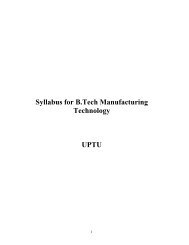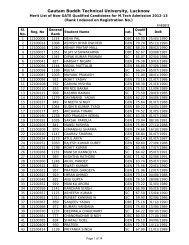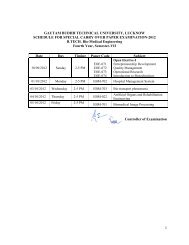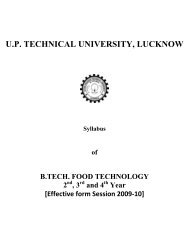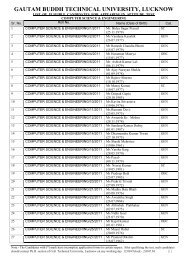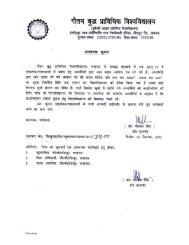NOTE MASTER OF BUSINESS ADMINISTRATION (MBA): The ...
NOTE MASTER OF BUSINESS ADMINISTRATION (MBA): The ...
NOTE MASTER OF BUSINESS ADMINISTRATION (MBA): The ...
You also want an ePaper? Increase the reach of your titles
YUMPU automatically turns print PDFs into web optimized ePapers that Google loves.
SUGGESTED READINGS<br />
1) Lesikar R V and Pettit Jr J D- Business Communication: <strong>The</strong>ory and Application (Tata McGraw-Hill, 2002)<br />
2) Tayler Shinley - Communication for Business (Pearson Education, 2002)<br />
3) Bovee C L et al- Business Communication Today (Pearson Education, 2002), New Delhi<br />
4) Hargie O et al- Communication Skills for Effective Management (Palgrave, 2004)<br />
5) T N Chhabra, Bhanu Ranjan – Business Communication (Sun India, 2004)<br />
6) P.D. Chaturvedi – Business Communication (Pearson Education)<br />
7) Meenakshi Raman-Technical Communication- (Oxford University Press)<br />
<strong>MBA</strong> 211: MANAGEMENT ACCOUNTING Max. Hours: 40<br />
Unit I (6 Sessions)<br />
Introduction: Accounting for Management, Role of Cost in decision making, Management Accounting and Cost Accounting as<br />
internal control tools, types of cost, cost concepts, full costing, overhead allocations, preparation of cost sheet.<br />
Unit II (10 Sessions<br />
Marginal Costing: Cost, Volume, Profit analysis, P/V ratio, analysis and implications, Concept and uses of contribution, Breakeven<br />
point and its analysis for the various types of decision-making like single product pricing, multi product pricing,<br />
replacement, sales etc. Differential Costing and incremental costing;: concept, uses and applications, Method of calculation of<br />
these cost and its role in management decision making like sales, replacement, buying etc.<br />
Unit III (10 Sessions)<br />
Budgeting: Concept of Budget; Budgeting and Budgetary Control, Types of Budget, Static and Flexible Budgeting,<br />
Preparation of Cash Budget, Sales Budget, Production Budget, Materials Budget, Capital Expenditure Budget and Master<br />
Budget, Advantages and Limitations of Budgetary Control.<br />
Standard Costing: Concept of standard costs, establishing various cost standards, calculation of Material Variance, Labour<br />
Variance, and Overhead Variance, and its applications and implications.<br />
Unit IV ( 8 Sessions)<br />
Responsibility Accounting: Concept and various approached to responsibility accounting, concept of investment center, cost<br />
center, profit center and responsibility center and its managerial implications, Transfer Pricing – Multinational transfer pricing,<br />
market based transfer pricing, cost-based transfer pricing, Cost of Quality and Time<br />
Unit V (6 Sessions)<br />
Neo Concepts for Decision Making: Concept, distinctive features of Activity Based Costing, Cost Drivers, Cost of Activities,<br />
Cost object such as product, service, customer. Cost Management: concept, strategies and applications.<br />
Value Chain Analysis, Target Costing, Life Cycle Costing<br />
SUGGESTED READINGS:<br />
1) Horngren et al- Introduction to Management Accounting (Pearson, 12 th edition), 2002<br />
2) Khan and Jain- Management Accounting (Tata McGraw-Hill, 2000) 3 rd ed.<br />
3) Pandey I M- Management Accounting (Vikas, 3 rd edition), 2004.<br />
4) Bhattacharyya S K and Dearden J- Accounting for Management (Vikas), 1987, 8 th ed.<br />
5) Sahaf M A- Management Accounting: Principles and Practice (Vikas), 2000.<br />
<strong>MBA</strong> 212: PRODUCTION AND OPERATIONS MANAGEMENT Max. Hours: 40<br />
Unit I (8 Sessions)<br />
Transformation process model: Inputs, process and outputs; Classification of operations; Responsibilities of Operations<br />
Manager; New Product Development, Selection and Design of Product / Services.<br />
Unit II (8 Sessions)<br />
Process types in manufacturing: project, jobbing, batch, line, mass, continuous; Process types in services: professional services,<br />
services shops, mass services; Plant location; Layout planning.<br />
Unit III (8 Sessions)<br />
Production Planning & Control: Production planning techniques for various process choices, techniques of production control,<br />
aggregate planning techniques,<br />
Unit IV (8 Sessions)<br />
Quality management: Introduction; Meaning; Quality characteristics of goods and services; Tools and techniques for quality<br />
improvement: check sheet, histogram, scatter diagram, cause and effect diagram, Pareto chart, process diagram, statistical<br />
process control chart; Quality assurance; Total quality management (TQM) model; Service quality, concept of Six Sigma and<br />
its application.<br />
Unit V (8 Sessions)<br />
Productivity Improvement Techniques: Work study; Method study; Work measurement: time study: stop watch time study;<br />
Work sampling.<br />
Maintenance: maintenance policies for facilities and equipment; Time of failure; Preventive versus breakdown maintenance;<br />
Procedure for maintenance, total productive maintenance (TPM)<br />
6


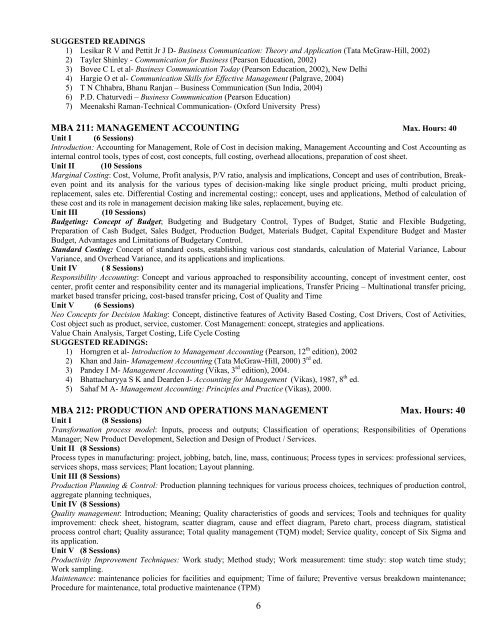
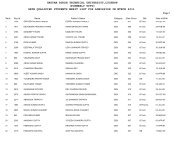
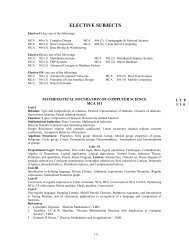
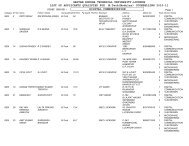
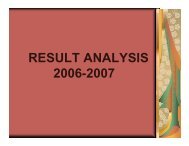
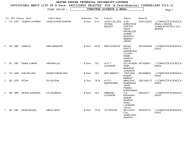
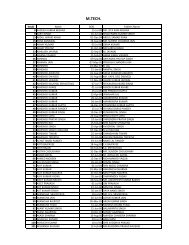
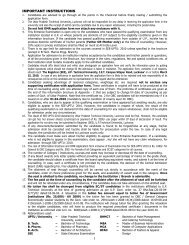
![[MODEL QUESTION PAPER] B-Tech FIRST SEMESTER ...](https://img.yumpu.com/47613205/1/190x245/model-question-paper-b-tech-first-semester-.jpg?quality=85)
